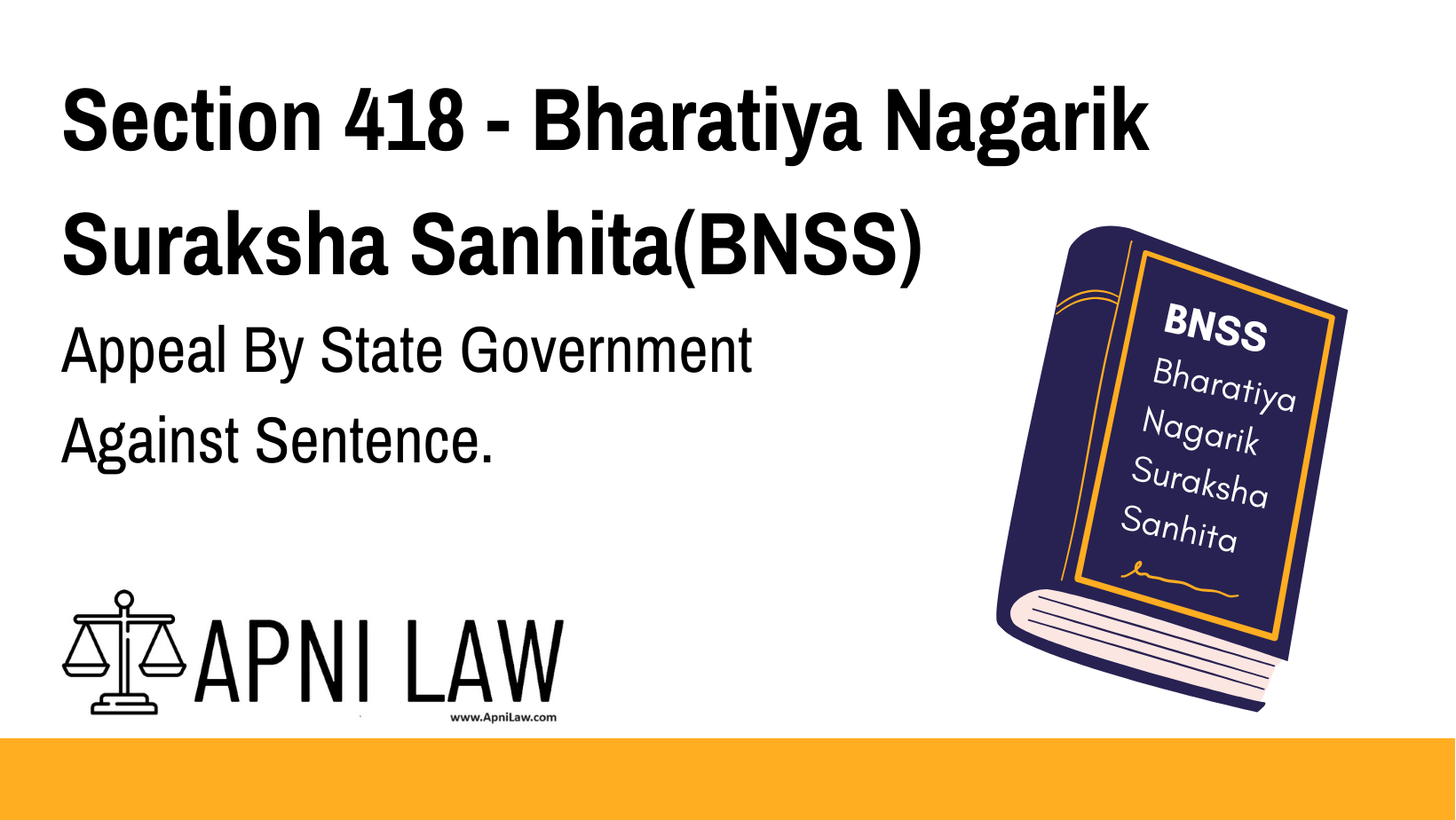Code
Section 418 BNSS
(1) Save as otherwise provided in sub-section (2), the State Government may, in
any case of conviction on a trial held by any Court other than a High Court, direct the Public
Prosecutor to present an appeal against the sentence on the ground of its inadequacy—
(a) to the Court of Session, if the sentence is passed by the Magistrate; and
(b) to the High Court, if the sentence is passed by any other Court.
(2) If such conviction is in a case in which the offence has been investigated by any
agency empowered to make investigation into an offence under any Central Act other than
this Sanhita, the Central Government may also direct the Public Prosecutor to present an
appeal against the sentence on the ground of its inadequacy—
(a) to the Court of Session, if the sentence is passed by the Magistrate; and
(b) to the High Court, if the sentence is passed by any other Court.
(3) When an appeal has been filed against the sentence on the ground of its
inadequacy, the Court of Session or, as the case may be, the High Court shall not enhance
the sentence except after giving to the accused a reasonable opportunity of showing cause
against such enhancement and while showing cause, the accused may plead for his acquittal
or for the reduction of the sentence.
(4) When an appeal has been filed against a sentence passed under section 64,
section 65, section 66, section 67, section 68, section 70 or section 71 of the Bharatiya
Nyaya Sanhita, 2023, the appeal shall be disposed of within a period of six months from the
date of filing of such appeal.
Explanation of Section 418 BNSS
This section empowers both the State Government and the Central Government to file appeals against inadequate sentences imposed by lower courts. It also ensures that if the court decides to enhance a sentence, the accused gets a fair chance to defend themselves.
- Who Can File an Appeal?
- State Government: Can appeal in cases where a trial was conducted by any court other than the High Court.
- Central Government: Can appeal if the conviction was based on an investigation by a Central agency under a Central Act.
- Where Will the Appeal Be Filed?
- If the Magistrate passed the sentence, the appeal goes to the Court of Session.
- If any other court passed the sentence, the appeal goes to the High Court.
- Fair Hearing for the Accused
- If the sentence is being enhanced, the accused must be given a fair chance to present their defense.
- The accused can also argue for their acquittal or for a reduced sentence.
- Time Limit for Appeals
- If the appeal concerns certain specific sections (64-71 BNS), the appeal must be resolved within six months.
Illustrations
Example 1: State Government Appeals for a Harsher Sentence
A Magistrate sentences Ramesh to six months imprisonment for a crime where the minimum prescribed punishment is two years. The State Government finds the sentence too lenient and directs the Public Prosecutor to appeal to the Court of Session for a harsher sentence.
Example 2: Central Government Challenges Sentence Based on Central Act
A CBI investigation leads to Ajay’s conviction, but the court only imposes a fine instead of imprisonment. The Central Government, considering the sentence inadequate, files an appeal in the High Court.
Example 3: Court Allows the Accused to Argue for a Lesser Sentence
During an appeal, the High Court considers increasing Priya’s sentence from one year to three years. However, before doing so, the court allows Priya to argue why her sentence should not be enhanced. She also requests for a reduction instead of an increase.
Common Questions and Answers
1. Can a victim file an appeal under Section 418 BNSS?
No, this section specifically allows only the State Government or the Central Government to file an appeal against an inadequate sentence. However, victims may have other legal remedies under BNSS.
2. What happens if the court decides to enhance the sentence?
The accused must be given a fair opportunity to explain why the sentence should not be enhanced. They can also plead for acquittal or sentence reduction.
3. Is there a deadline for resolving appeals under this section?
Yes, if the appeal involves Sections 64-71 of the Bharatiya Nyaya Sanhita, 2023, it must be resolved within six months.
4. Can the State and Central Government both appeal in the same case?
Yes, if the offense was investigated by a Central agency under a Central Act, both the State Government and the Central Government may have the right to file an appeal.
Conclusion
Section 418 BNSS provides an essential mechanism for challenging inadequate sentences to ensure that justice is served appropriately. It allows both the State and Central Governments to appeal for harsher sentences in specific cases while also ensuring fairness to the accused. By mandating that appeals under certain sections be resolved within six months, the law aims to prevent undue delays in the justice system.
For more legal insights, visit ApniLaw! 🚀








